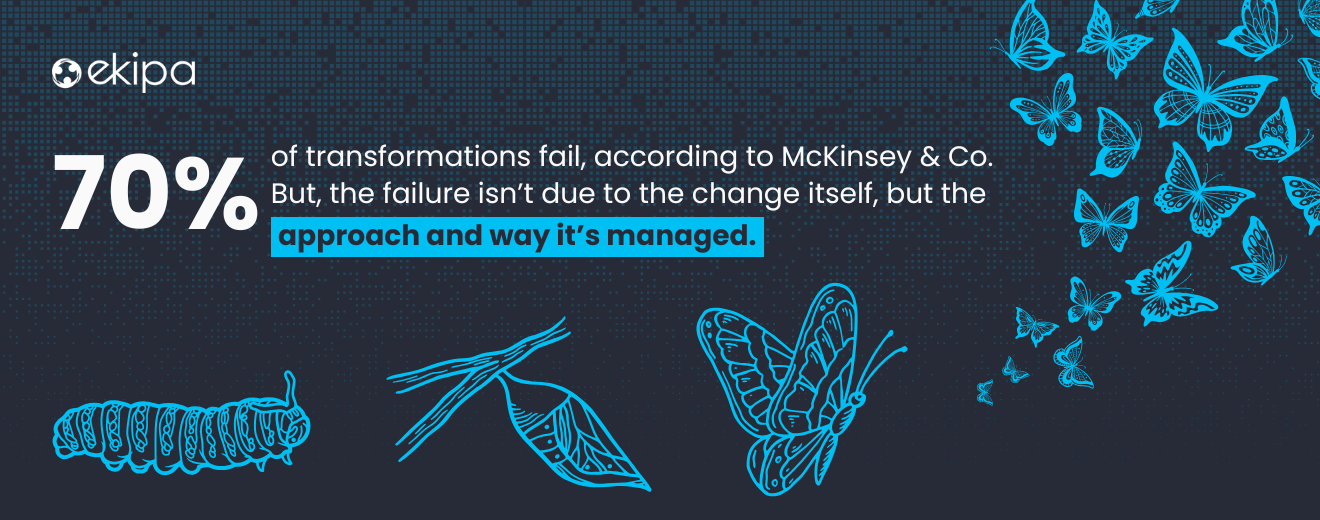In a world where change is constant, and the pace of innovation is ever-accelerating, the success of organisations hinges on their ability to adapt.
With a staggering 70% failure rate for transformation initiatives, as reported by McKinsey & Co., it’s clear that many businesses struggle to navigate these complex journeys.
Why Do 70% of Organisational Transformations Fail?
Why do so many organisational transformations fall short? The answer often lies in mindset shifts, leadership effectiveness, and the overall approach to change.
This article explores key lessons from failed initiatives and highlights strategies that can help organisations not only survive but thrive in a rapidly changing landscape.
Learning from Failure
While many organisational transformations may not achieve their original goals, they provide essential learning experiences. Companies that treat failures as opportunities for improvement tend to iterate and are more likely to succeed.
The mindset shift from failure avoidance to rapid adaptation is essential.
Frequently we see companies fail to create safe-to-fail environments, which hinders their ability to learn from mistakes. Psychological safety—where employees feel secure to experiment without fear of retribution—is key to transformation success. This safety allows for calculated risks, trial-and-error learning, and growth.
The principles of Agile highlight the value of investigation through doing. Companies can learn passively by gathering insights, but actively trying and failing with deliberate experiments fosters a culture of innovation. Each failure offers new understandings that can inform the next iteration of transformation efforts.
Related: Crafting a Successful Digital Transformation Strategy for Your Business
Change is Inevitable; Preparedness is Essential
Markets, technology, and customer needs evolve whether companies want them to or not. Every year, a new technology disrupts the market, forcing organisations to pivot.
In 2024, generative AI emerged as a major disruptor, compelling businesses across industries to rethink their operations. This pattern of disruption is constant, and preparedness becomes the key differentiator between organisations that stagnate and those that thrive.
Anticipating change, understanding emerging technologies early, and building resilience are critical steps to staying ahead. Companies that embrace change proactively are not only prepared for disruption—they welcome it.
Conversely, failure to evolve often results in stagnation, which can be more damaging than even a failed transformation effort.
Related: Building High-Performing Teams is the Key to Your Organisation’s Success
The Role of Leadership and Culture in Organisational Transformations
The success or failure of transformation initiatives largely depends on leadership’s ability to cultivate a culture of openness, trust, and agility.
It’s not enough to simply execute new strategies—leaders must engage their teams and foster an environment where continuous improvement is part of the organisational DNA.
Intent-Based Leadership, a concept introduced by David Marquet, shifts leaders’ roles from controllers to enablers. In this model, leaders act as guides who empower employees to make decisions and take ownership of outcomes.
Similarly, servant leadership focuses on serving and elevating the team rather than directing them. Both leadership styles are critical in fostering a culture that is adaptable and ready for change.
The Cost of Inaction
Not embarking on a transformation journey can be even more costly. Companies that fail to adapt face disrupted industries, competitive threats, and shifting customer expectations.
While 70% of change initiatives may fail, 100% of companies that refuse to change will eventually be left behind. Failing to take proactive steps leaves organisations vulnerable to disruption from more agile competitors capable of quickly responding to market shifts.
Consider the example of Netflix, which initially offered DVD rentals by mail but boldly transitioned to online streaming services.
This move disrupted the entertainment industry, allowing Netflix to outpace traditional rental companies and ultimately make DVD rental services and DVD technology obsolete.
Today, Netflix has evolved into a multi-billion-dollar entertainment giant by continuously adapting to consumer needs.
Related: Adapt or Disappear – How Business Agility Helps Companies Thrive in This Digital Age
Organisational Transformations Are Not One-Off Events
Organisations often treat change as a linear project with a clear start and end; however, in reality, it’s a continuous journey. The companies that succeed are those that build change into their DNA—constantly evolving with market trends, customer demands, and technological advancements.
Take Google and Microsoft, for example. These two tech giants may already be household names, but they are far from complacent. Both continuously find new ways to reinvent themselves in highly competitive industries.
Google has expanded its portfolio by investing heavily in areas such as Artificial Intelligence (AI), quantum computing, and cloud services. Products like Google Cloud and innovations from DeepMind demonstrate Google’s commitment to long-term, transformative change. Its diversification into self-driving technology with Waymo further illustrates that even industry leaders must continually transform.
Similarly, Microsoft has significantly evolved under Satya Nadella’s leadership by shifting focus toward cloud computing with Azure—now a leader in the space—and making bold moves in the gaming industry through acquisitions like Bethesda and Activision Blizzard.
The lesson here is clear: even established companies must continuously transform to maintain their competitive edge. Organisations shouldn’t view transformation as a one-off project but as a continuous process of iteration, learning, and adaptation.
Success Lies in Small Wins and Iterative Change
The high failure rate of transformation initiatives often reflects large-scale transformations with rigid, top-down approaches.
However, smaller, frequent, iterative changes rooted in agile practices are far more likely to succeed. By focusing on incremental value and minimising risk, organisations can make measurable progress without the fear of monumental failure.
Agile principles—such as frequent delivery, customer feedback loops, and short iterations—help businesses adapt in real-time. This ensures that transformation efforts are not only sustainable but also closely aligned with customer needs.
This shift transforms the conversation from “Why bother with transformation?” to “How can we rethink and better manage transformation?”
Final Thoughts
Organisational Transformation isn’t dead—it just needs a smarter approach. Emphasising resilience, adaptability, leadership engagement, and incremental success can help guide businesses toward more successful purposeful or vision lead outcomes.
As industries evolve rapidly, the companies that thrive will be those that treat transformation not as an event but as a continuous journey of learning, adapting, and improving.

.png)






